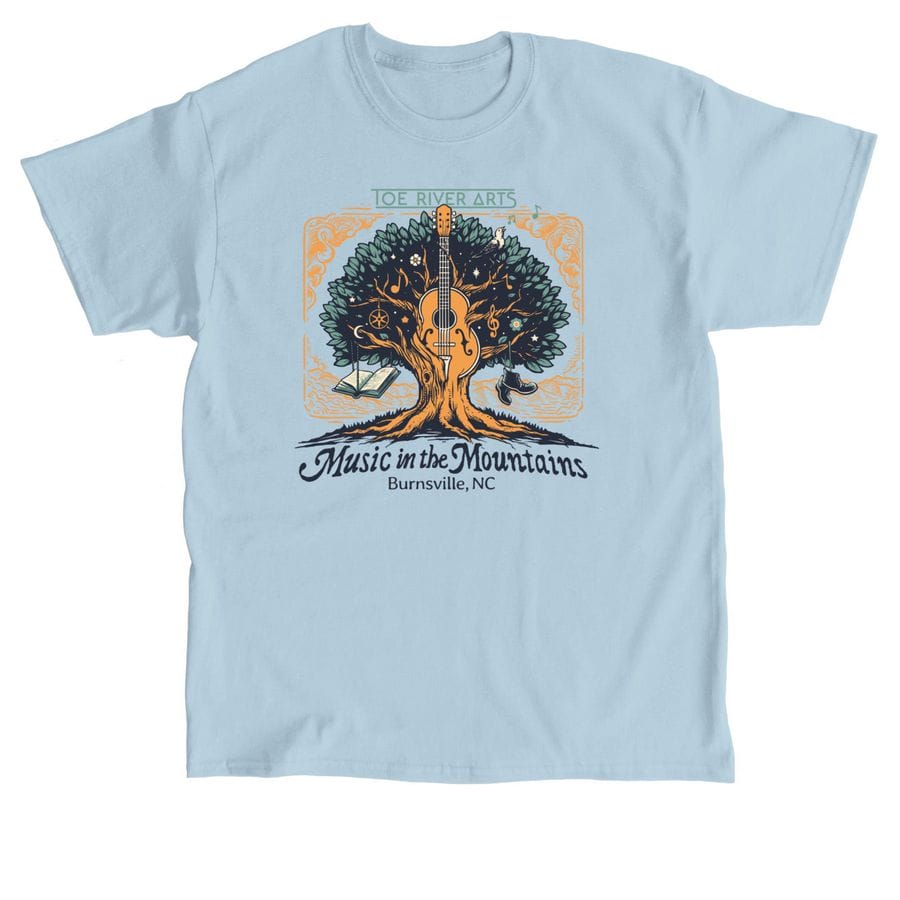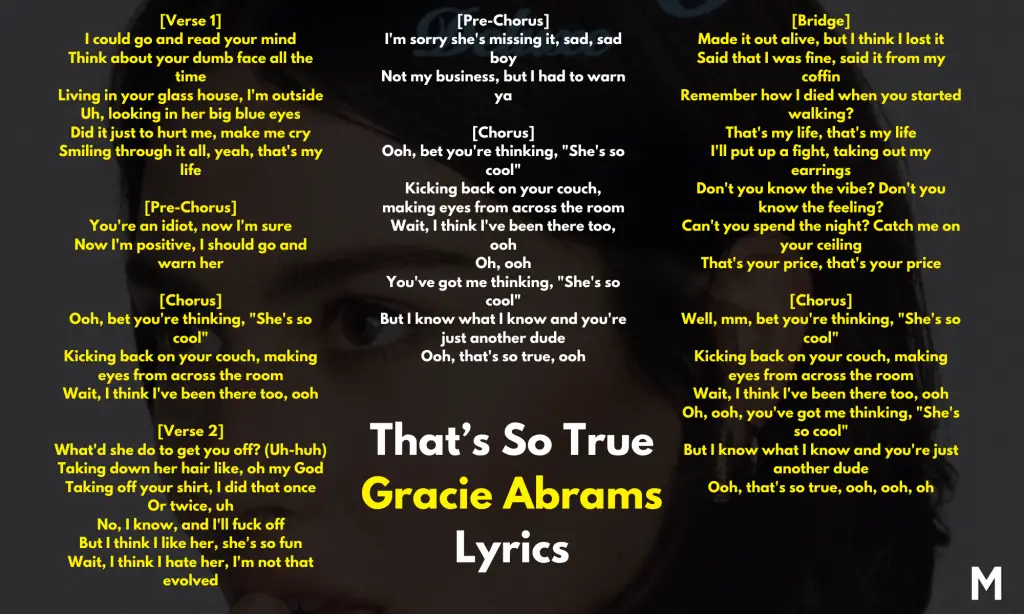Table of Contents
Image C/O Interscope Records
Gracie Abrams’ deluxe version of The Secret of Us has a lot of people talking, and “That’s So True” is one of the standout tracks that digs deep into the messiness of heartbreak. With her emotionally raw and introspective lyrics, Abrams continues to explore those familiar feelings of jealousy, betrayal, and trying to move on—topics that she’s been performing live on tour and ones that really resonate with fans.
These are just my personal takes, but I think connecting Abrams’ lyrics to the works of Sylvia Plath, Dorothy Parker, and William Blake gives us a more nuanced view of the song. It’s always fun to stretch those literary muscles and see what classic poetry can reveal about the timeless nature of love and loss.
From what I’ve seen, fans have been eager to unpack the deeper meanings in The Secret of Us, and Abrams has been performing “That’s So True” live during her U.S. tour dates, where it’s gotten a strong response. As she wraps up her North American shows and prepares to support Taylor Swift’s Eras Tour, Abrams has built a lot of momentum around the deluxe version of her album. Songs like “I Love You, I’m Sorry” and “Close to You” have already gained major traction on the charts, and “That’s So True” fits right into this emotional landscape.
That’s So True Gracie Abrams Lyrics
That’s So True Gracie Abrams Meaning
Let’s examine these lyrics together and examine how poets like Sylvia Plath, Dorothy Parker, and William Blake have tackled similar themes.
These poets give us extra ways to think about the feelings in the song, like jealousy, betrayal, and emotional conflict. I’ll point out some lines from their poems as we go, but we’ll keep the focus on the song lyrics and the emotions behind them.
“I could go and read your mind / Think about your dumb face all the time”
In these opening lines, the speaker is stuck obsessing over their ex. They’re thinking about them constantly, even though they’re angry and frustrated. It’s like the speaker knows they shouldn’t be spending so much time thinking about their ex, but they just can’t help it. This is where we see jealousy take over—wanting to know what the ex is thinking, even though they aren’t together anymore.
This reminds me of how Sylvia Plath talks about love in her poem Mad Girl’s Love Song. Plath writes, “I shut my eyes and all the world drops dead,” which is kind of like how the speaker in the song can’t stop thinking about their ex. Just like Plath’s speaker, this one feels stuck in their own head, where everything is focused on their feelings of hurt and betrayal.
“Living in your glass house, I’m outside”
Here, the speaker talks about being left out of their ex’s new life. The “glass house” feels important because it shows how fragile the situation is. The speaker feels like they’re on the outside looking in, watching their ex move on with someone new. They can see everything that’s happening, but they’re not a part of it anymore.
William Blake’s poem The Sick Rose connects with this idea. In the poem, Blake writes, “O Rose, thou art sick,” which is about how something beautiful (like love) can be destroyed by something hidden, like jealousy or betrayal. Just like the “glass house” in the song, Blake’s “sick rose” shows how something that seems perfect can really be broken on the inside.
“You’re an idiot, now I’m sure”
When the speaker says, “You’re an idiot,” it’s a big shift.
They’re starting to see their ex for who they really are, not through the rose-colored glasses of love. The speaker realizes the relationship wasn’t good for them, and they even say they should go and “warn” the new girl. This shows how the speaker feels like they’ve learned something their ex hasn’t, and now they want to pass on that knowledge.
This moment reminds me of Dorothy Parker’s poem A Very Short Song, where she writes, “Once, when I was young and true, / Someone left me sad— / Broke my brittle heart in two; / And that is very bad.” Parker’s speaker, like the one in the song, has been hurt and now looks back with a mix of sarcasm and bitterness. Both speakers have reached a point where they can see the relationship for what it was, even if it still stings.
“Ooh, bet you’re thinking, ‘She’s so cool’”
This line shows the speaker’s jealousy of the new person in their ex’s life. The speaker imagines their ex being totally into this new girl, thinking she’s “so cool,” but there’s a lot of sarcasm in this line. It’s like the speaker is mocking their ex’s excitement about someone new. But deep down, it also shows that the speaker is hurt by being replaced.
The line “Wait, I think I’ve been there too” makes it clear that the speaker is remembering their own time with the ex. They were once the “cool” one, too, but now they’ve been pushed aside. This feeling of being easily replaced ties back to the jealousy we saw earlier.
In Mad Girl’s Love Song, Sylvia Plath also writes about being stuck in a painful memory: “I dreamed that you bewitched me into bed / And sung me moon-struck, kissed me quite insane.” Like Plath’s speaker, the person in the song is haunted by memories of a past relationship, feeling the sting of being replaced.
“What’d she do to get you off? / I did that once, or twice”
Here, the speaker directly compares themselves to the new girl. They’re asking what this new person is doing that’s so special, because the speaker has been there before—they’ve had the same experiences with the ex. These lines show how painful it is to think about someone else taking their place, doing the same things they used to do with the ex.
This back-and-forth between feeling hurt and feeling bitter really connects with Blake’s The Sick Rose. Blake writes about how love can be “sick” without anyone noticing at first. The speaker in the song is going through the same thing—they’re realizing that their love wasn’t as special as they once thought, because it’s so easily repeated with someone new.
“But I think I like her, she’s so fun / Wait, I think I hate her, I’m not that evolved”
This part of the song shows how mixed up the speaker’s feelings are. One moment, they think they like the new girl, and the next, they’re jealous and angry. It’s a really honest look at how confusing emotions can be after a breakup. The line “I’m not that evolved” is funny but also true—it shows that the speaker knows they’re not handling things perfectly but are just doing their best.
This idea of conflicting emotions is present in all the poems I’ve mentioned. In A Very Short Song, Parker captures the same kind of mix of hurt and sarcasm when she writes about love and heartbreak. She’s bitter but also a little amused by how predictable the whole thing is. It’s the same for the speaker in the song—they’re hurt but also know that these feelings are part of the process of moving on.
“Made it out alive, but I think I lost it”
In the bridge, the speaker reflects on how they’ve survived the breakup but don’t feel the same anymore. The image of a “coffin” shows just how much the end of the relationship has affected them—it’s like a part of them died when the relationship ended. But even though they’ve lost something, they’re still here, ready to fight through the pain.
Blake’s The Sick Rose also discusses how something beautiful can be destroyed from the inside. In both the poem and the song, love is damaged, but the speaker is still standing, even if they’ve been changed by it.
“Ooh, bet you’re thinking, ‘She’s so cool’ / But I know what I know and you’re just another dude”
In the final chorus, the speaker repeats the line about the ex thinking the new girl is “so cool,” but by now, they’re more detached. They’re starting to move on and realize that their ex isn’t as special as they once thought. The line “you’re just another dude” shows that the speaker is finally seeing their ex as just another person, not someone worth all this emotional energy.
In conclusion, this song is all about dealing with the messy feelings that come after a breakup—jealousy, hurt, and trying to let go. By comparing these lyrics to poems by Sylvia Plath, Dorothy Parker, and William Blake, we can see that these themes aren’t new. Writers have been exploring these same emotions for a long time, and this song taps into those same deep feelings of heartbreak and betrayal.
Themes, Meanings, And Main Takeaways
The lyrics in That’s So True are centered on emotional turmoil—Abrams confronts her feelings of jealousy and betrayal as she reflects on a relationship that’s ended. One of the clearest themes is how the speaker feels both bitter and trapped, unable to move on from the hurt. In the line, “I could go and read your mind / Think about your dumb face all the time”, Abrams shows how the speaker is stuck obsessing over her ex-partner. This mirrors the mental anguish we see in Sylvia Plath’s Mad Girl’s Love Song, where Plath’s speaker is similarly caught up in obsessive thoughts about someone they loved: “I shut my eyes and all the world drops dead”.
Both songs and poems dig into how heartbreak can leave us stuck in our own heads, unable to break free from painful memories.
Another big theme in the song is betrayal, especially in how Abrams uses the line “Living in your glass house, I’m outside”. The “glass house” feels fragile and breakable, just like the trust in a relationship that’s been shattered. This calls to mind William Blake’s The Sick Rose, where Blake uses the image of a rose destroyed by a hidden worm. Like the relationship in Abrams’ song, the rose seems beautiful on the surface but is ultimately damaged from within.
The “glass house” metaphor also reflects how the speaker feels left out, watching her ex move on with someone else. It’s a clear visual of exclusion and heartache, something that resonates strongly throughout the song and ties back to the idea of fragile love that Blake explores.
Finally, one of the more interesting takeaways from That’s So True is the speaker’s emotional conflict toward the “other woman.” In the line “But I think I like her, she’s so fun / Wait, I think I hate her, I’m not that evolved,” Abrams captures the mixed feelings of jealousy, admiration, and insecurity. The speaker acknowledges that they aren’t “evolved” enough to deal with these emotions maturely, which is an honest reflection on how messy relationships can be. Dorothy Parker’s A Very Short Song touches on a similar bitter truth, with the line “Once, when I was young and true, / Someone left me sad—”.
Parker’s blunt acknowledgment of how fleeting and hurtful love can be is a perfect match for the sarcasm and honesty in Abrams’ lyrics. Both Parker and Abrams embrace the emotional contradictions of heartbreak, offering a realistic look at how love doesn’t always make sense. Together, these literary connections help highlight the deeper truths behind That’s So True and show how Abrams’ lyrics tap into universal themes of love, loss, and self-reflection.
The post That’s So True Gracie Abrams Lyrics And Meaning: Connecting Her Lyrics to Poetry’s Timeless Themes appeared first on Magnetic Magazine.






